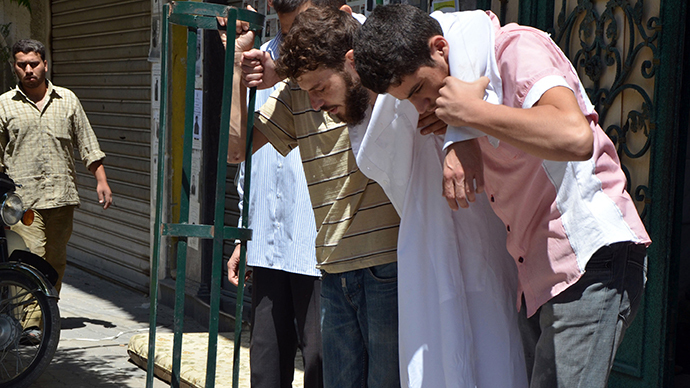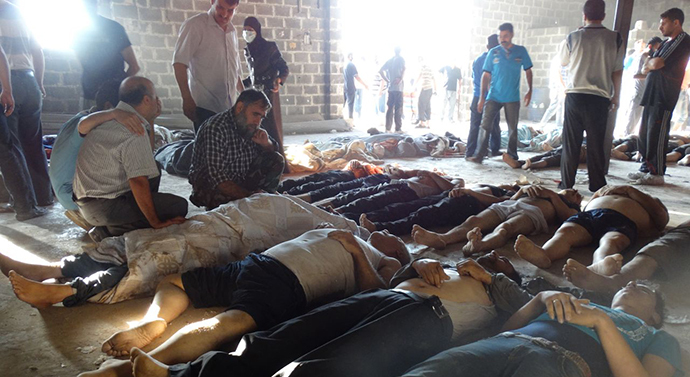Syrian opposition is only beneficiary of chemical attack

It’s obvious the Syrian government does not benefit from the latest chemical attack in Syria, while for the opposition it would be a key to unlock airstrikes and a bombing campaign over Syria, a la Libya, geopolitical analyst Patrick Henningsen told RT.
Various reports of recent chemical weapons use in Syria appeared on
Wednesday. The casualty numbers are conflicting, ranging from
dozens to almost 1,200 deaths. This comes on the same day that UN
inspectors arrive in Damascus to investigate allegations of use
of toxic arms.
RT:All we have now are unconfirmed reports, but media sources quote Syrian rebels and they put the number of kills to more than a thousand now. Do you think they are a reliable source and if it is confirmed that the attack has taken place do you think that the Syrian army could have carried it out?
Patrick Henningsen: It is a very strange situation we find ourselves here where Washington and London are putting the burden of proof on the Assad government in Damascus, where in fact the burden of proof should be on the accusers of this particular event. There is no evidence to suggest exactly what happened, we only have reports from the opposition activists in Damascus. We don’t know what happened and how it happened. Until we resolve these two things we will not be able to jump to conclusions. Anything at this point is speculation.
RT:Would the Assad government resort to such an attack knowing the UN investigators are in the country right now?
PH: Reuters came out saying that they cannot confirm
independently these reports. Janes International also reported to
Reuters that it doesn’t make any sense for the Syrian government
to deploy a chemical weapon only miles away from the very hotel
that the UN weapons inspector booked into only a few days ago.
They see this as a distraction and if we look at the history of
this particular region where the attack is set to take place it
is very active with Al-Nusra Front and they also have been
implicated in using make shifts chlorine bombs in Aleppo back in
March, so there is a track record there. The evidence
unfortunately doesn’t stack up with these present claims of the
Syrian government perpetrating these attacks.

RT:It is still clear why the fingers are being pointed at the Syrian government, because it is the government which has chemical weapons.
PH: All this at this point is innuendo. This is why the UN team is in Damascus to investigate these claims. Unfortunately Washington, London and Paris drew a red line in 2012. They said that if any side deploys chemical weapons then that would be a pretext for a military intervention either by NATO or some sort of coalition force backed by US resolution. Who benefits from a chemical attack in Syria? The opposition benefits. It is quite obvious that the government does not benefit. The opposition benefits because that would be the key to unlock the airstrikes and bombing campaign over Syria, a la Libya. The opposition would like a Libyan-style coalition with NATO in order to force the regime in power out of Damascus. They benefit from any report of chemical attack in Syria.
RT:Al-Arabiya puts the number of killed at more than 600 while other main stream media talk about just dozen of victims. Why is there such a difference?
PH: You have to consider the source. I believe Al-Arabiya
has certain affiliations with certain Gulf states who might also
have some interest in this particular conflict already so might
see a more exaggerated report on different sides. But again,
there is no independent verification, it is simply anecdotal and
innuendo to this point. But the timing of it is very suspect.
The statements, views and opinions expressed in this column are solely those of the author and do not necessarily represent those of RT.













